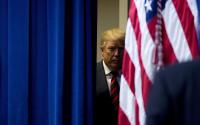By Kareem M. KamelResearcher - International Relations 15/04/2003
This Fourth World War, I think, will last considerably longer than either World Wars I or II did for us. As we move towards a new Middle East, over the years, and, I think, over the decades to come... we will make a lot of people nervous. Our response should be, "Good! We want you nervous. We want you to realize now, for the fourth time in 100 years, this country and its allies are on the march."1 - James Woolsey/former CIA Director
For globalization to work, America can’t be afraid to act like the almighty superpower it is... The hidden hand of the market will never work without the hidden fist - McDonalds cannot flourish without McDonnell Douglas, the designer of the F-15. And the hidden fist that keeps the world safe for Silicon Valley's technologies is called the US Army, Air Force, Navy and Marine Corps.2 - Thomas Friedman, New York Times Columnist. The 9th of April, 2003, will always be remembered as a sad day in the history of the Arab and Muslim world. Baghdad, the capital of a major Arab state, falls under direct Anglo-American occupation, exactly 745 years after the Mongol invasion of the ancient city. The fall of Baghdad is a precedent-setting event fraught with perilous repercussion; it represents a culmination of a new era for Iraq and the entire Middle East. It is an event on par with the 1948 and 1967 wars, after which maps were redrawn and regional politics restructured on terms more favorable with the agenda of colonial Western powers.
While networks around the world focused on the pictures of a few hundred jubilant Iraqis and a small crowd trying to pull down a Saddam statue in a highly exaggerated, overly-publicized event, Red Cross representatives said that the situation in other areas of the city were extremely hostile.3 More importantly, Baghdad’s hospitals seemed to be overwhelmed by the inflow of dead and war-wounded patients being treated in the absence of water, electricity, or proper medication due to dwindling supplies after more than 12 years of devastating US-instigated sanctions. Ironically, the land of Hammurabi which witnessed the first proclamation of human law in history, descended into widespread anarchy and disorder, with numerous looting incidents of banks, public buildings, embassies, shops, hospitals, universities and museums with priceless artifacts. US soldiers, supposedly responsible for establishing law and order as an occupying force, worked only to secure the Iraqi Ministry of Oil building in Baghdad, but watched idly by as looters transported stolen goods in pick up trucks yelled "Thank you, Mr. Bush."
If the experience in Basra is anything to judge by, the spontaneous crime wave in Baghdad could be followed by an organized phase as armed gangs moved in. In addition, thousands of the Saddam fedayeen militias and Republican Guard troops remain unaccounted for and many could simply resurface as paramilitary groups bent upon inflicting harm on the invading US and British forces later in the conflict. After the assassination of Abdul Majid al-Khoei, the prominent US-backed Shi’ite cleric in Iraq’s holiest mosque by a rival Shia group, and the bombing carried out by a man wearing an explosive-packed vest against a US checkpoint in Saddam city, Iraq could be slowly moving into a low-intensity phase of civil conflict.4
George Bush and Tony Blair both gave speeches on the new "Towards Freedom TV" to the Iraqi people, most of whom probably did not have a chance to see it due to the lack of electricity in most of Baghdad. In an effort to convert Iraq’s Muslims to Christianity, several Evangelical groups are beginning what they call "aid evangelism" - delivering thousands of 70-pound food packages labeled with biblical verses in Arabic. Frank Graham, the leader of two Evangelical organizations at the Iraqi border, is known to have said in a George W. Bush Inaugural, that Islam (the faith of 97% of Iraqis) is a "very evil and wicked religion."5 Obviously, Anglo-American planners spent more time on war-making than on the development of a coherent strategy aimed at state-building and ensuring a smooth transition of power in a country that has a volatile recipe for disintegration along ethnic, tribal and sectarian lines. The fear is that the US and Britain would either subject Iraq to an open-ended occupation under the leadership of the pro-Israeli General, Jay Garner, or support the development of local fiefdoms based upon tribal or religious figures who are capable of maintaining order, but may eventually turn out to be not less tyrannical than the previous regime.6
Most reports suggest that the sudden collapse of the regime was due to a US attack on Saddam Hussein and many of his top aides meeting at a compound in Al-Mansour district in Baghdad. The US received intelligence from CIA operatives and Iraqi collaborators on the ground. Twelve minutes later, B-1B bombers armed with four 2,000-lb JDAM bunker-busters released their payload on the site, unleashing an 8500°F fireball and a shock wave that melted away anything in sight. Many new figures are showing up to try to fill in the power vacuum created after the regime’s disappearance. Despite many Iraqi criticisms, Britain announced that it would appoint an unnamed tribal sheikh to run the Basra province. Many pointed out that tribal sheikhs in Basra would appoint members of their own tribe to key posts and others talked about the oppressive role they played under Saddam’s rule.
On the other hand, famous Iraqi opposition leader, Ahmed Chalabi, convened a meeting of Iraqi opposition figures in his hometown of Nassiriya to rally support for his self-proclaimed "coronation" as leader of this area.7 In northern Iraq, age-old struggles for power are being played out between Kurds, Arabs, and Turkmen with a constant Turkish threat of intervention should the Kurdish fighters remain in Mosul and Kirkuk.
Storms of Change - The World After the War
If the picture of Iraq today is one of chaos, uncertainty and unpredictability, what does the war on Iraq represent to the global agenda? What questions does it pose concerning the nature of international relations? What dimensions of international transformation are we witnessing first-hand?
One of the major aspects of change in international relations following the war on Iraq and the diplomatic haggling in the UN that preceded it is the reaffirmation of the realist doctrine with its emphasis on the supremacy of individual national security, power politics and the gruesome reality of zero-sum thinking. A corollary to this aspect of global change is the US disregard for international law and its explicit attempts to subvert the UN either by ignoring its relevance in war/peace situations or by turning it into "a rubber stamp for geopolitical operations of dubious status under international law or the UN charter."8 In many instances, the US has set itself as a prosecutor, judge, jury and executioner in its own cause and has sought to establish itself as the global law-maker and sheriff, setting the rules and acting alone or at the head of a posse of compliant allies to impose discipline and stamp out foreign threats.9 The most recent manifestation of this trend was the decision of the US to withdraw a UN Security Council resolution authorizing war after failing to win sufficient support to pass it, and its perception of a narrow UN role that only involves the reconstruction of post-war Iraq without any role in its political process. The Anglo-American meeting at Belfast on post-war Iraq was an affirmation of the right of those two nations to restructure Iraq according to their preferences.10 In response, the Kremlin announced that the antiwar triad of France, Russia and Germany would hold their own summit in St. Petersburg, Russia. Sadly, the Iraqi case illustrated that the Islamic world has become the arena in which superpower politics and struggles for influence are being played out, not only in pre-war UN diplomacy but for post-war reconstruction deals over the "spoils of the war."
The Dirty Job of Empire Building The very notion of unprovoked, uninvited, country-wide invasion of Iraq, contradicts the model which shaped US foreign policy since 1945. Whether it was NATO, the global financial architecture designed at Bretton Woods or the UN itself, multilateralism was the foundation upon which the US sought to build its world order. Given the Bush doctrine with its emphasis on the unilateral use of force, its distaste for multilateralism and its insistence on the elusive concept of "regime change," coercion has become the mechanism of choice for settling international disputes, and military invasion has been legitimized as the ultimate arbiter in settling international conflict. Ironically, the US, an ardent supporter of domestic jurisdiction over its own affairs, engaged in a war that was a total violation of another state’s sovereignty.11
The war on Iraq was the clearest manifestation of the decadence of America’s "soft power" - a country’s ability to shape events by persuasion and attraction. A country has more "soft power" if its culture, values and institutions incite admiration and respect in other parts of the world and if its diplomacy and standing in international bodies enable it to build alliances. Yet in the early months of 2003, American diplomacy could not persuade more than 3 of the 14 other members of the UN Security Council to back a resolution that would legitimize military action in Iraq. Neither longstanding US allies such as Chile, Germany, Mexico and Pakistan, nor newer ones such as Russia, would speak out for the resolution. Then another ally, Turkey, refused to allow US troops to enter Iraq from its territory. Only British and Australian soldiers are fighting alongside the Americans in Iraq. Hatred of American policies in the Arab world has never been higher, while in every West European country, including Britain, opinion polls show that George Bush is seen as a greater threat to world peace than Saddam Hussein.12
Notions such as the "global village" and complex interdependence in which conflict becomes minimal and societies become enmeshed in a global web of mutual interests13 have faded away. The role of the United States has shifted from being simply a hegemon that plays a leading role among a group of consenting states, to a unilateral imperial power that makes and enforces the rules of international behavior by the force of arms.14
Another victim of the war on Iraq has been freedom of information. The events of "Black Tuesday" in which 3 journalists were wounded and 3 others killed including two cameramen from Reuters and the Spanish Telecinco, and famous Al-Jazeera reporter, Tarek Ayoub, whose office was destroyed by an American bomb, are clear evidence that US targets have no limits. UN High Commissioner for Human Rights, Sergio Vieira de Mello, deplored those attacks on journalists, recalling Article 79 of the Protocol Additional to the Geneva Conventions which states that "journalists engaged in dangerous professional missions in areas of armed conflict shall be considered as civilians."15 Al-Jazeera has had its share of US violations when many of its reporters were harassed on several occasions, and its office was bombed in Kabul in November 2001. In addition, Sami El-Hajj, Al-Jazeera photographer, was sent to Guantanamo’s Camp X-Ray in December 2001.16
Another incident relating to freedom of information involved veteran war correspondent and Pulitzer Prize winner, Peter Arnett, who was sacked by his US employers for simply giving an interview to Iraqi television. In many ways, the war on Iraq vividly illustrated the death of the "professional war correspondent" who is independently and objectively trying to gather information and the rise of the more convenient "embedded correspondent" tailored to voice the Pentagon’s views. Arnett had been accused by the White House as a "conduit for Iraqi disinformation" for simply reporting that a shattered Iraqi building was not a chemical/biological weapons facility, but rather a factory producing milk powder for Iraqi children.17
Conclusions There is no doubt that the war on Iraq and its repercussions represent an upheaval in international relations and a transformation of the concept of "world order." The US doctrine of pre-emptive warfare and unilateral military action is intended to send a message to other superpowers or would-be powers, to fall in line with US demands or face devastation. The purpose of the war was what strategists call "demonstration effect" - showing the world that Washington was ready to impose its will at all costs. On the other hand, as the North Korean example has so vividly illustrated, the ultimate guarantor of security in a world of power politics and self-help has become nuclear weapons.
The Anglo-American occupation of Iraq is the culmination of America’s quest for an empire ruled by the iron fist of JDAMs, MOABs, and depleted uranium munitions. Clearly, the war against Iraq was aimed at Arab and Muslim humiliation rather than liberation. Sadly, Iraqis have to witness the "smaller" looting of their public buildings by opportunists and the "larger" looting of their oil resources by the Anglo-American invaders. Given the ongoing atrocities in Palestine by the US-blessed Israeli forces, the presence of US troops in Kuwait to a quarter of that state’s territory, and the now, permanent bases in Saudi Arabia, Afghanistan, Turkmenistan, Uzbekistan, Kazakhistan and in other Gulf sheikhdoms, the Islamic world - and not only Iraq - is under occupation. The US is also engaged in multiple military activities against Islamists in the southern Philippines and in the former Soviet Republic of Georgia. In addition, the United States has pledged to tackle Syria and the Iranian-backed Hizbullah group in what it calls "phase three" of the "war on terror" in order to entice Israel into accepting the so-called "road map." Deputy Defense Secretary Paul Wolfowitz, regarded as the real architect of the Iraqi war and its aftermath, said: "There will have to be change in Syria, plainly."18 And then, we ask, is it by coincidence that all the targets designated by the US military are Muslim?
Kareem M. Kamel is an Egyptian freelance writer based in Cairo, Egypt. He has an MA in International Relations and is specialized in security studies, decision-making, nuclear politics, Middle East politics and the politics of Islam. He is currently assistant to the Political Science Department at the American University in Cairo.
1 Ed Vulliamy and Kamal Ahmed, “The Fight Yet to Come,” The Guardian April 6th, 2003
2 Stephen Gowans, “A McDonalds in Every Foreign Port Worth This?” Media Monitors Network February 22nd, 2001
3 “While Networks Show Jubilant Iraqis, Red Cross Say Situation is Unacceptable,” Jihad Unspun April 9th, 2003
4 Brian Whitaker, “Fears for the Future,” The Guardian April 11th, 2003
5 Amanda Bower and Aparisim Ghosh, “A Faith-Based Initiative,” Time.com April 13th, 2003
6 Brian Whitaker, “Symbolic in More Ways Than One,” The Guardian April 11th, 2003
7 For details, refer to Mark Thompson and Timothy J. Burger, “The Hit,” Time.com April 13th, 2003 and Ned Potter, “Underground Warfare,” April 8th, 2003 ABC News
8 Richard Falk and David Krieger, “Subverting the UN,” Waging Peace November 4th, 2002
9 Michael Byers, “Terror and the Future of International Law,” in Ken Booth and Tim Dunne, eds. Worlds in Collision: Terror and the Future of Global Order (Palgrave: New York, 2002): 125
10 Robin Wright and David Holley, “Already Postwar Iraq is a Divisive Subject,” LA Times April 9th, 2003
11 Jonathan Freedland, “Emperor George,” The Guardian April 2nd, 2003
12 Charles Grant, “The Decline of American Power,” Center for European Reform Bulletin April/May 2003
13 Robert Keohane and Joseph S. Nye, “Complex Interdependence and the Role of Force,” in Robert J. Art and Robert Jervis, eds. International Politics: Enduring Concepts and Contemporary Issues (Harper Collins: New York, 1992): 170-185.
14 Robert Keohane, “Hegemony in the World Political Economy,” in Robert J. Art and Robert Jervis, eds. International Politics: Enduring Concepts and Contemporary Issues (Harper Collins: New York, 1992): 254-266.
15 “Senior UN Officials Concerned Over Journalists Death in Iraq,” Relief Web April 9th, 2003
16 Seedi Ahmed Bin Ahmed Salem, “Al-Jazeera: A History of Harassment,” Al-Jazeera.net April 9th, 2003 (in Arabic)
17 Chris Jones, “Peter Arnett: Under Fire,” BBC News April 4th, 2003
18 Ed Vulliamy, “Syria Could Be Next,” The Guardian April 13th, 2003
http://www.islamonline.net/English/Views/2003/04/article07.shtml






